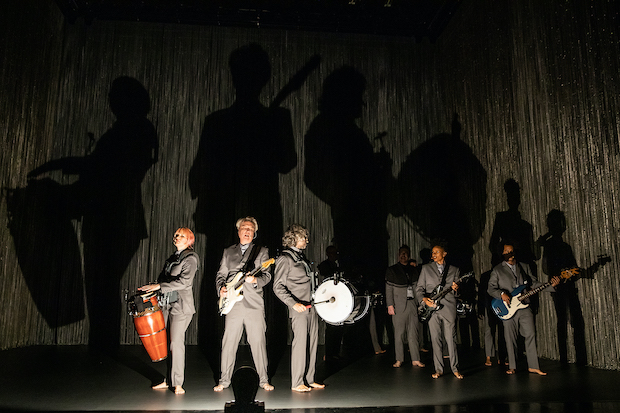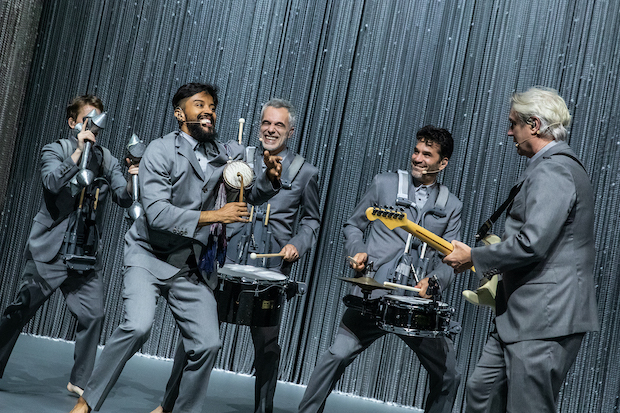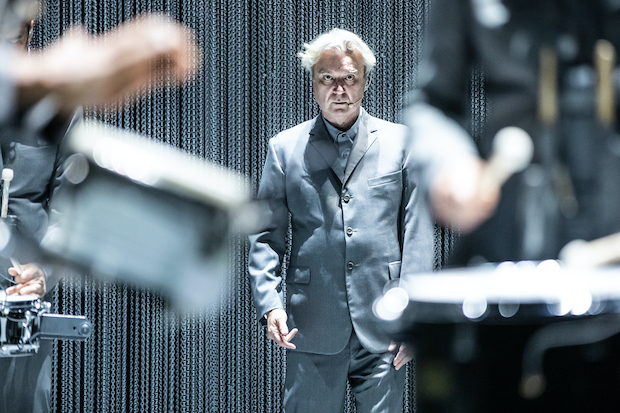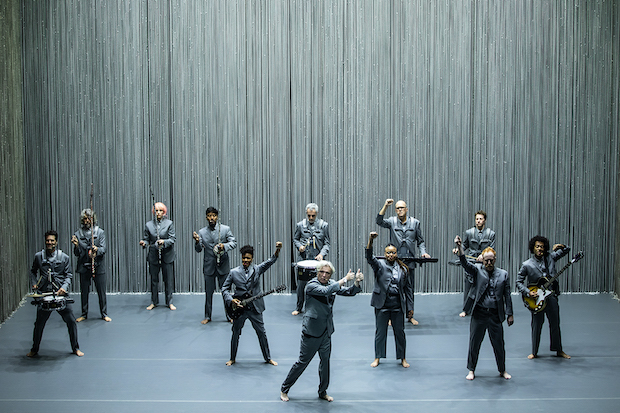Review: David Byrne's American Utopia and the Boomer Vision of a Perfect World
The popular Broadway concert is back in a new home.

(© Matthew Murphy)
The first family vacation I remember was a week in Destin, Florida, during which my parents played the Taking Heads album Speaking in Tongues on repeat. They played it so much that an older priest on sabbatical in the adjacent unit eventually knocked on the door and asked them to turn it down, as he simply could not stand the constant "pound pound pound" in his words. For years they fondly recalled the encounter as proof of their allegiance to the counterculture: pissing off an old Catholic priest with their noisy music.
Like Talking Heads front man David Byrne, my parents are part of the baby boomer generation. And while the early New Wave band might have hit its peak during the cultural coming-of-age of Generation X, it gained plenty of fans among the boomers, that generation of eternal teenagers for whom rock and roll is a living faith. And after viewing the arsenal of percussion that parades across the stage at David Byrne's Broadway concert, American Utopia, it is hard to dispute the old priest's assessment — even as that pound pound pound has come to represent not the knocking of barbarians at the gate of middle-class propriety, but the downbeat of dominant culture. Do you still get to call yourself a rebel into your 60s and 70s, when your generation controls the politics, economics, and cultural means of production of the most powerful empire on Earth? And what kind of utopia has the hegemony of the boomers brought this country?
Those questions circled my brain like ravenous vultures during much of Byrne's bountiful feast of a concert at the St James Theatre. To be clear: American Utopia is still the joyfest it was when it first opened at the Hudson Theatre in 2019 — and if there is anything audiences need desperately right now, it is joy.

(© Matthew Murphy)
It was in abundance the night I attended, from the moment Byrne appeared onstage with a model of the human brain, singing "Here." He was soon joined by 11 other multitalented performers who danced, sang, played instruments, and sweated it out on an empty gray stage for 100 exuberant minutes.
It's impossible not to groove in your seat to "Lazy," or want to join the drum circle on "I Zimbra," if only to shake those maracas that look like they were made for a Super Mario villain. "Everybody's Coming to My House" offers an explosion of energy with a twinge of anxiety (as established by Byrne's introduction). "Every Day Is a Miracle" is pure bliss. And "Burning Down the House" gets everyone in the house on their feet.
The tunes in American Utopia are the result of liberal borrowing from world musical traditions — proof positive that culture is appropriation. And the magpie at the center of the nest is Byrne, an amiable if slightly alien figure who shares his genuine wonder at the world with 1,700 guests every night. He's almost the perfect manifestation of the boomer mission to move beyond stifling conventions and institutions in order to unlock the potential within every individual, and it's hard to resist his idiosyncratic charm. He makes an ideal tour guide through American Utopia, almost like a children's television host for adults.

(© Matthew Murphy)
Younger audiences will find plenty to like about American Utopia, from the virtuosity of the musicians to Annie-B Parson's weird and wonderful choreography. The ever-moving musical formations onstage bring to mind the cheerful alliance of the high school drama club and marching band, a pact more ancient than NATO. But the major draw for ticket-buyers is nostalgia — seeing Byrne up-close and momentarily reliving those times you were young and high and infuriating the old folks with your pound pound pound. For many older Americans, that is well worth a $250 ticket to sit in the front orchestra.
Not that this is a possibility for all: If the boomer generation's purpose was to lead a rebellion against conformist middle-class values, what better way to triumph than to foreclose — through depressed wages, mounting debt, and the value of real estate — on the possibility of anyone ever joining the middle class again? The bloated price of theater tickets is among the least consequential symptoms of the great separation, in which a small percentage of Americans (enough to keep Broadway houses full) have become wealthy while everyone else has slipped into the precariat.

(© Matthew Murphy)
The uniform gray suits worn by the band betray a world in which a new conformity has set in (personally, I would have gone with Amazon delivery vests). It looks like the famous Apple commercial, before the lady runs up to the screen with her sledgehammer. Who knew that the screen to which we would be in thrall would actually be tiny enough to fit in our pocket?
Byrne's thesis for the evening seems to be that while we lose synapses in our brains as we grow older (hence the model brain at the beginning) we can replace those lost connections with connections to other people, and this is the path to Utopia. This is a lovely casserole of self-improvement, relationship advice, and New Age bunkum. But as all of these sections have expanded at Barnes & Noble (since these are the only type of books people read anymore), I don't feel like we've gotten any closer to the promised land.
Even the seemingly edgy parts of the show, like the Janelle Monáe number "Hell You Talmbout," in which Bryne and company urge us to say the names of Black people murdered by the police, feels like another call-and-response in a secular religion that has been widely adopted in America's power centers, from the biggest corporations to the smallest web publications. Can any of this really be categorized as counterculture anymore?
Perhaps the title American Utopia is tongue-in-cheek. Perhaps Byrne and company realize that the promise of boomer counterculture was always a clever marketing ploy, and that any successful utopian project inevitably slides into dystopia. The particular boomer-designed dystopia in which we find ourselves has a great soundtrack, but I keep wondering when its sledgehammer moment will finally arrive.








